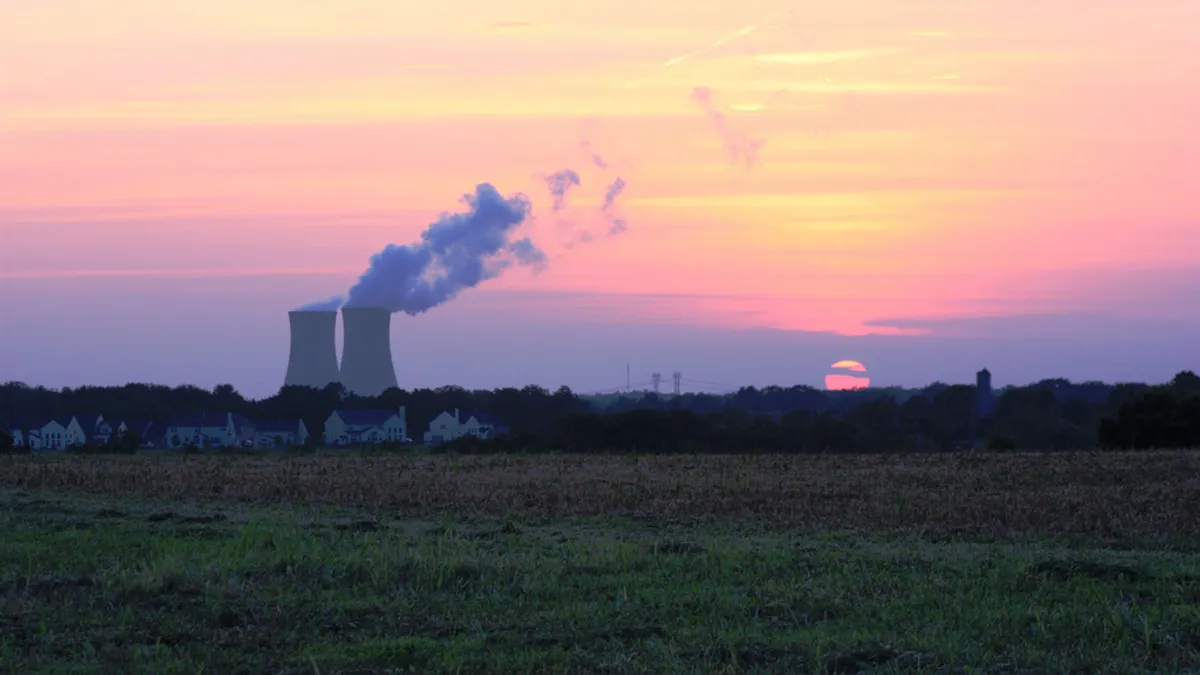Dive Brief:
-
Multiple European utilities expressed interest in the past about buying at-risk U.S. nuclear plants, but were turned off by federal rules limiting foreign ownership of U.S. nuclear assets, a former Nuclear Regulatory Commissioner told a House committee on Tuesday.
-
Former Commissioner Jeffrey Merrifield revealed that interest during the hearing on new nuclear legislation and said one proposed bill, intended to direct the Department of Energy to review its technology transfer rules for U.S. nukes, could result in looser requirements.
-
The committee also discussed three other bills focused on advanced nuclear, including one that would create a new DOE program focused on more highly enriched nuclear fuel, which DOE officials say will be critical for a next generation of small, flexible reactors. Energy Subcommittee Chairman Fred Upton, R-Mich., said he intends to move the bills to the full House.
Dive Insight:
There are currently two "tests" in the NRC’s criteria for nuclear plant sales. A foreign entity may not own a majority stake in a U.S. nuclear asset, and companies from any country deemed “inimical” to U.S. interests are completely prohibited.
While it was "several years ago," Merrifield said those rules soured interest from European utilities in U.S. nuclear assets. Now a partner at law firm Pillsbury, Merrifield testified before a House Energy and Commerce subcommittee on behalf of ClearPath Action.
"We have heard interest previously from European folks who would be interested in potentially purchasing plants," Merrifield told Utility Dive. "This was in the past, and had that provision not been in place they at least would have entertained coming into this market."
Merrifield declined to name companies or plants targeted, saying the interest was not previously public information. But he noted that nuclear assets in other countries were kept online after being bought out by foreign entities.
"EDF bought UK nuclear assets a long time ago. They don't have this prohibition, and that allowed some energy assets that were threatened in the UK to continue to operate," he said. "So, to the extent that we have U.S. reactors shutting down, getting rid of that prohibition would allow an increased number of potential buyers for those plants rather than just going ahead and shutting them."
Merrifield, appointed to the NRC by President Bill Clinton in 1998, said he supports the committee's discussion draft to review the NRC’s transfer rules, but would prefer if the feds just do away with the first "test" outright.
"When I was on the [NRC] ... the commission went on record saying we felt that the first of those tests, the absolute prohibition on foreign ownership, should be excluded and that the inimicality provision is sufficient," he said. "So NRC could make a determination even though foreign utilities would qualify to purchase it, if it was inimical to the United States they could stop it."
While still early in the legislative process, the technology transfer draft and three other pieces of pending legislation received approval from both sides of the aisle, beyond some concerns over managing the nonproliferation risk of nuclear fuels.
That included a new bipartisan measure aimed at developing more highly enriched nuclear fuel for a next generation of reactors.
Small modular reactors (SMRs) that could hit commercial markets in the next decade will need more highly enriched fuel than used in current plants, DOE Assistant Secretary Ed McGinnis told lawmakers. The development of those fuels, called high-array low enrichment uranium (HALEU), lags behind progress in the plants themselves.
"No commercial enricher currently provides HALEU," McGinnis said. "While current enrichment plants could be modified to produce HALEU, it is unlikely that a commercial HALEU capability would be pursued without further indication of progress toward deployment by advanced reactor vendors."
The DOE is currently developing its own enrichment capabilities for the National Nuclear Safety Administration (NNSA) before its stockpile of enriched uranium runs out in about 20 years, said Brent Park, head of the NNSA. But the commercial need for HALEU could arrive earlier than that, McGinnis said.
"We may have a much earlier timeline in the commercial sector — as soon as the mid 2020s — where the commercial sector may need HALEU," he said.
The bill would address that by creating a DOE program to boost the development of nuclear fuel with up to a 20% enrichment rate — significantly higher than the 5% limit put on nuclear fuels today. McGinnis said DOE appreciates the bill and will work with the committee to develop it, but more work will likely be needed.
"When you get [commercial need for HALEU] you also not just need that enrichment, but conversion, you’re going to need fabrication, you’re going to need new NRC-licensed transportation packages, so there’s a lot to be done," he said.
In addition to the fuel enrichment and technology transfer bills, legislators also considered a bill to change NRC fee structures and a measure that would direct DOE to study the resilience benefits of potentially siting SMRs at military installations once they are available. Upton said that after further development, he hopes to pass the legislation through the full committee and present it to the House for approval.
"We intend to move these bills," he said.













